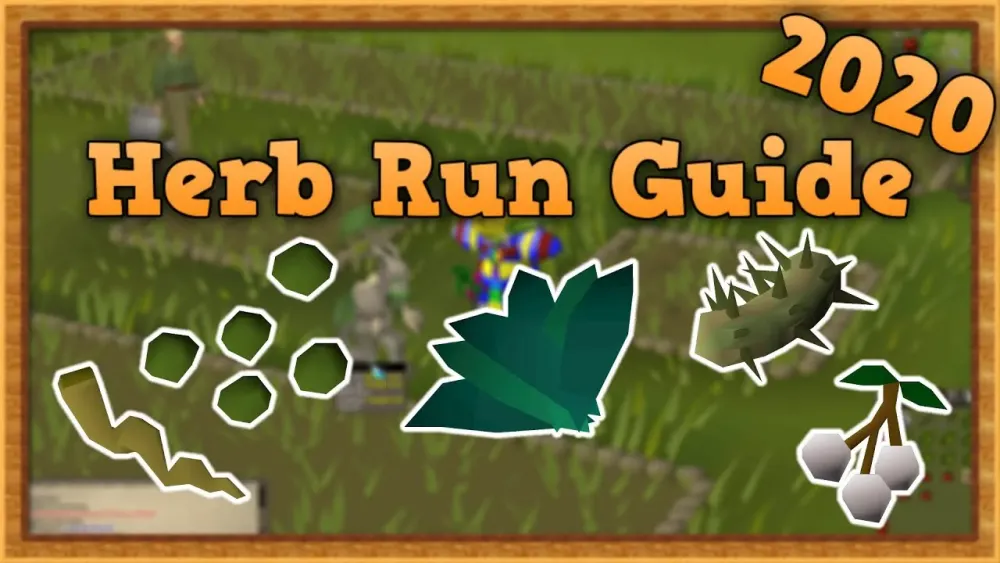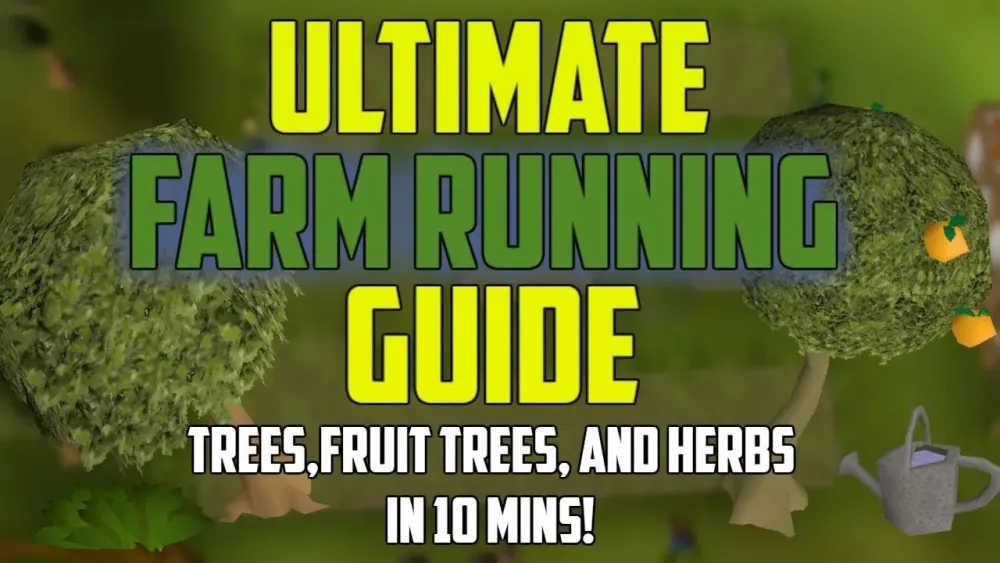Your cart is empty
The Ultimate Herb Farming Guide for OSRS

Herb farming in Old School RuneScape (OSRS) is a lucrative and rewarding skill that allows players to grow their own herbs for potions, trading, and other uses. It combines elements of farming, combat, and money-making, making it a popular choice among players. With the right strategies, you can maximize your herb yield and profit, contributing to your overall success in the game. This guide will delve into the essentials of herb farming, including choosing the right herbs, optimal farming locations, and tips to enhance your farming efficiency.
When it comes to herb farming in OSRS, the choice of herbs is crucial for maximizing profit and efficiency. The most common herbs grown are Guam, Marrentill, Tarromin, and others, each with its own unique benefits and market demand. To select the right herbs, consider factors such as your Farming level, the profitability of the herbs, and their requirements for growth.
For beginners, starting with Guam is advisable, as it requires only level 1 Farming and is commonly used in low-level potions. As you progress, consider farming Marrentill and Tarromin, which yield higher profits and are used in a variety of potions. Once you reach higher Farming levels, herbs like Ranarr, Krandl and Torstol become accessible, offering substantial profits due to their demand in high-level potions.
Another factor to consider is the growth time of the herbs. Some herbs, like Torstol, take longer to grow but can yield higher profits. Conversely, faster-growing herbs, such as Guam and Marrentill, can provide quicker returns on your investment. Balancing between fast-growing and high-value herbs is key to maintaining a steady income.
Additionally, pay attention to the current market trends on the Grand Exchange. Prices fluctuate regularly based on supply and demand, so staying informed will help you make better decisions about which herbs to farm. For instance, if the price of a particular herb is high, it may be worth focusing your efforts on that herb, even if it’s not the fastest to grow.
Lastly, consider utilizing herb patches that have a lower chance of disease. Locations like the Catherby herb patch and the Trollheim patch provide less risk of crop failure, ensuring more successful harvests. Always use supercompost in your patches to increase the yield and decrease the chance of disease, further enhancing your profit margins.
By carefully selecting the right herbs based on your level, market trends, and growth characteristics, you can optimize your herb farming strategy and maximize your profits in OSRS.
Best Locations for Herb Farming

When it comes to herb farming in Old School RuneScape (OSRS), location is everything. Choosing the right spot can significantly enhance your farming efficiency and yield. Here are some of the best locations you should consider:
- Falador Farm: This is one of the most popular locations for herb farming. It’s close to a bank, making it easy to deposit your herbs. Plus, the nearby patch can be reached quickly, minimizing your downtime.
- Ardougne Farm: Known for its proximity to the Ardougne Cloak teleport, this farm is a fantastic choice. The patch here is surrounded by multiple farming spots, allowing for efficient herb gathering.
- Kandarin Farm: Located near the Tree Gnome Stronghold, this area offers multiple herb patches. It’s a bit farther from a bank but compensates with a higher herb yield.
- Hosidius House: If you’re a member of the Hosidius House in Zeah, their farming patches are incredibly efficient, especially when combined with the nearby bank.
Additionally, consider the following tips for choosing your herb farming location:
- Look for patches that are close to banks or teleportation spots.
- Choose locations with multiple patches to maximize your yield.
- Be mindful of the quests required to access certain areas.
Herb Farming Techniques and Tips

Getting the most out of your herb farming requires some strategy and techniques. Here’s a compilation of effective methods to help you farm herbs like a pro:
- Use of Farming Tools: Make sure to carry a spade and a seed dibber. These tools are essential for planting and harvesting herbs.
- Planting Smart: Always check the type of herb seeds you have. Some herbs grow faster than others, so choose wisely based on your goals.
- Utilize Super Compost: Using super compost when planting can significantly increase the yield and reduce the chance of disease.
- Check for Weeds: Regularly check your patches for weeds. If you let them grow for too long, they can choke out your herbs.
Here are some *additional tips* to enhance your farming experience:
| Tip | Description |
|---|---|
| Join a Farming Clan | Connect with other players who can share farming tips and locations, making your experience more enjoyable. |
| Level Up Your Farming Skill | Higher farming levels allow you to plant a wider variety of herbs, increasing your potential profit. |
By following these techniques and tips, you’ll be well on your way to becoming a master herb farmer in OSRS!
5. Understanding Herb Cleaning and Profitability
Herb cleaning is a crucial aspect of herb farming in Old School RuneScape (OSRS). It involves removing the unwanted dirt from herbs after you’ve harvested them. The process not only increases the value of the herbs but also prepares them for use in potions and other alchemical processes.
Here’s why understanding herb cleaning is essential:
- Increased Value: Clean herbs can be sold for a higher price on the Grand Exchange, which translates to better profits. For example, cleaned herbs like Ranarr weed can sell for a significantly higher amount than their uncleaned counterparts.
- Experience Gain: Cleaning herbs grants you Farming experience. This experience can help you level up and unlock higher-level herbs and farming methods.
- Preparation for Potion Making: If you plan on making potions, cleaned herbs are necessary. Many potions require specific cleaned herbs to create.
The profitability of herb farming largely depends on the types of herbs you choose to grow. Some popular options include:
| Herb | Uncleaned Price | Cleaned Price |
|---|---|---|
| Ranarr Weed | 1,000 | 1,500 |
| Snapdragon | 2,500 | 3,000 |
| Torstol | 1,800 | 2,300 |
In summary, understanding herb cleaning and its impact on profitability is vital for any serious herb farmer in OSRS. By investing time in cleaning your herbs, you set yourself up for greater rewards!
6. Utilizing Farming Contracts for Herbs
Farming contracts are an excellent way to maximize your herb farming efficiency in OSRS. Introduced with the Farming update, these contracts allow players to grow herbs and receive rewards, including seeds, farming experience, and sometimes even rare items.
Here’s how you can make the most out of farming contracts:
- Accessing Contracts: You can obtain farming contracts from the Farming Guild or from specific NPCs like Gerrant in the Kandarin area. Simply talk to them, and you’ll receive a contract that specifies the type of herb to grow.
- Rewards for Completion: Once you’ve successfully grown and harvested the required herb, return to the NPC to claim your rewards. Rewards can vary but often include seeds, which can be reused to continue your farming cycle.
- Experience Boost: Completing contracts provides Farming experience, which is essential for leveling up. This experience can help you unlock higher-level herbs, increasing your profitability.
Moreover, farming contracts offer a variety of challenges that keep the game interesting. Some contracts may require you to grow specific herbs under certain conditions, encouraging you to experiment with different farming methods.
To summarize, utilizing farming contracts can significantly enhance your herb farming experience in OSRS. Not only do you get rewards, but you also enjoy the process of growing and harvesting herbs while leveling up your Farming skill!
7. Advanced Herb Farming Strategies
Once you’ve mastered the basics of herb farming in OSRS, it’s time to explore some advanced strategies to maximize your yield and efficiency. These tactics can help you grow herbs faster, reduce downtime, and make the most out of your farming trips.
- Utilize Farming Contracts: Engage with the Farming Guild‘s contracts for a chance to grow specific herbs. Completing these contracts can reward you with valuable items and experience points.
- Herb Boxes: Invest in herb boxes to store your herbs. This not only keeps your inventory organized but also saves time when collecting your harvested crops.
- Use Super Compost: Enhance your soil quality by using super compost. This increases your chances of a successful harvest and reduces the likelihood of disease.
- Plant Multiple Herbs: Don’t stick to just one type of herb. Diversifying your crops helps spread risk and ensures you have a steady supply of various herbs for potions.
- Farm in Groups: If you have friends who also farm herbs, coordinate your planting schedules. This way, you can share resources and help each other with herb cleaning.
- Level Up Your Farming: Higher farming levels unlock better seeds and new herb types. Focus on leveling up through quests and other farming activities.
Implementing these advanced strategies can dramatically enhance your herb farming experience and profits. Remember, the key to success is consistency and adaptability!
8. Common Challenges and Solutions in Herb Farming
Herb farming in OSRS can be rewarding, but it doesn’t come without its challenges. Here are some common issues players face and practical solutions to overcome them.
| Challenge | Solution |
|---|---|
| Pests and Disease: Herbs can become diseased, leading to reduced yields. | Use Compost: Regularly apply super compost to improve soil quality and reduce disease risk. |
| Low Yield: Sometimes, your crops may not produce as many herbs as expected. | Check Farming Level: Ensure your farming level is high enough for the specific herbs you’re growing. |
| Time Management: Balancing herb farming with other activities can be tricky. | Set a Schedule: Create a farming schedule that fits into your regular gameplay routine. |
| Inventory Space: Gathering herbs can fill your inventory quickly. | Use Herb Boxes: Store harvested herbs in herb boxes to free up space for other items. |
By addressing these common challenges with effective solutions, you can streamline your herb farming efforts and enjoy the benefits of your hard work. Happy farming!
The Ultimate Herb Farming Guide for OSRS
Herb farming in Old School RuneScape (OSRS) is a rewarding skill that allows players to grow their own herbs for potions, crafting, and profit. This guide covers everything you need to know about herb farming, from choosing the right herbs to optimizing your farming efficiency.
Choosing the Right Herbs
Different herbs have varying growth times, yields, and market values. Here’s a quick list of popular herbs and their key details:
| Herb | Growth Time | Yield | Market Value |
|---|---|---|---|
| Guam | 35 minutes | 1-3 | Low |
| Marrentill | 40 minutes | 1-3 | Moderate |
| Tarromin | 45 minutes | 1-3 | High |
| Ranarr | 60 minutes | 1-3 | Very High |
Farming Locations
Utilizing the best farming patches is crucial. Here are some prime locations:
- Falador Farm: Convenient for beginners.
- Ardougne: A great spot for high-level herbs.
- Herb patches in Prifddinas: Best for experienced players.
Farming Tools and Tips
To maximize your herb farming efficiency:
- Use spade for planting.
- Apply compost to increase yield.
- Utilize magic secateurs for a boost in herb yield.
Keep an eye on the market trends for your harvested herbs. Regularly check the Grand Exchange to ensure you’re selling at a profitable rate.
Conclusion: Mastering herb farming in OSRS not only enhances your potion-making abilities but also provides a lucrative source of income. By choosing the right herbs, utilizing optimal farming locations, and employing effective techniques, players can significantly improve their success in this essential skill.

